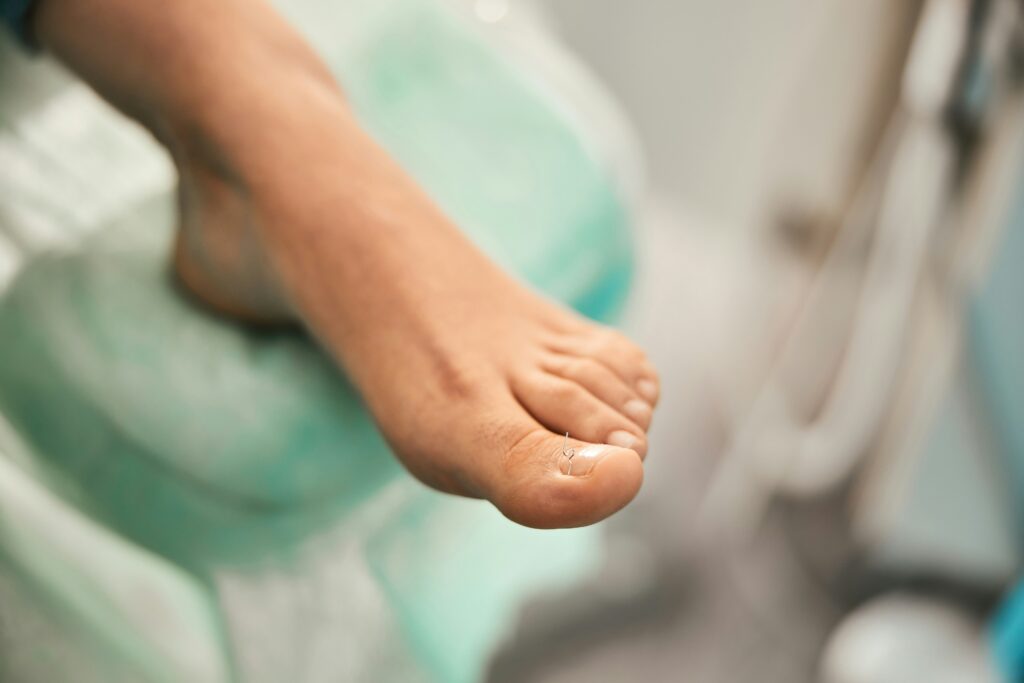The Reality of Diabetic Foot Ulcers (DFUs)
Every year, millions of people worldwide suffer from diabetic foot ulcers (DFUs), and recent research estimates that 26.1 million people across the globe are affected at any given time.
DFUs are open sores or wounds that develop on the feet of people with diabetes due to poor circulation, nerve damage, and delayed healing. Without the right care, these ulcers can become infected, leading to severe complications, including amputation.
At Restore First Health, we specialize in mobile wound care, ensuring patients receive advanced treatments, provided by a medical team, in the place they call home. Let’s break down what causes DFUs, how to prevent them, and what treatments are available to help you, or your loved one heal.
What Causes Diabetic Foot Ulcers
DFUs develop due to a combination of factors:
- Neuropathy (Nerve Damage): Diabetes can damage the nerves in your feet, making it hard to feel pain, cuts, or blisters. This means you might not notice a wound until it becomes serious.
- Poor Circulation: High blood sugar levels can cause vascular disease, limiting blood flow to the feet. Without enough oxygen and nutrients, wounds heal much more slowly.
- High Blood Sugar (Hyperglycemia): Elevated glucose levels weaken the immune system, making it harder for your body to fight infections and repair wounds.
- Pressure and Friction: Ill-fitting shoes, excessive walking, or standing for long periods can lead to calluses and blisters that turn into ulcers.
- Infections and Delayed Healing: Once a wound opens, bacteria can enter, leading to serious infections that could require hospitalization or even amputation.
Read: How Sleep Impacts Diabetic Foot Ulcers
How to Prevent Diabetic Foot Ulcers
Most diabetic foot ulcers are preventable with the right habits and care. Here’s how you can protect your feet:
- Choose the Right Shoes: Wear comfortable, well-fitting shoes that reduce pressure on your feet. Avoid walking barefoot, even indoors.
- Daily Foot Checks: Look at your feet every day for cuts, redness, blisters, or swelling, especially if you have neuropathy and can’t feel injuries.
- Keep Your Feet Clean & Dry: Wash your feet daily with mild soap and warm water. Dry thoroughly, especially between the toes, to prevent fungal infections.
- Trim Nails Carefully: Cut nails straight across to prevent ingrown toenails and infections. If you have trouble seeing or reaching your feet, ask for help.
- Manage Your Blood Sugar: Keeping glucose levels in check is one of the most powerful ways to reduce your risk of DFUs.
- Act Fast on Wounds: If you notice a cut, blister, or sore, don’t wait, seek medical attention immediately to prevent complications.
Watch: Brian suffered from a DFU for years, we healed him in his own home.
Advanced Treatment for Diabetic Foot Ulcers
If a DFU has already developed, early intervention is crucial. At Restore First Health, we provide advanced mobile wound care that brings treatment right to the patient’s bedside. Our specialists use advanced technology to accelerate healing and reduce the risk of infection.
The Restore First Health Approach Includes:
- Mobile Wound Care Teams: Our trained specialists come to your home, reducing the need for stressful hospital visits.
- Advanced Imaging & Diagnostics: We use advanced technology to detect harmful bacteria and determine the best treatment plan.
- Negative Pressure Wound Therapy (Wound VAC): This treatment sucks out bacteria and promotes blood flow, significantly speeding up the healing process.
- Bedside Vascular Studies (ABI Testing): We assess circulation issues that could slow healing and offer solutions to improve blood flow.
- Personalized Treatment Plans: Each patient receives a customized wound care plan, including specialized dressings, debridement (removing dead tissue), and infection management.
- Nutritional Support for Healing: We provide guidance on high-protein diets and supplements that help wounds heal faster.
- Seamless Care Coordination: We work closely with your doctors, home health teams, and caregivers to ensure you get the best possible care.
Don’t Ignore a Diabetic Foot Ulcer
Untreated DFUs can lead to amputations, and the mortality rate for patients with severe ulcers is higher than some cancers. With early intervention and advanced care, DFUs can heal fast.
At Restore First Health, our mission is to help patients with chronic and complex wounds regain their mobility and quality of life. We bring expert wound care directly to the bedside, so our patients can heal in the place they call home.
Contact us today:
We’ll coordinate the care, so you don’t have to.
- Refer a patient. https://restorefirsthealth.com/refer-a-patient/
- Schedule a consult. https://restorefirsthealth.com/request-a-consultation/
Follow us to keep up to the date on the latest health news:
- Rayman, G., Petrova, N. L., Edmonds, M. E. (2024). Diabetic foot ulcers: A global burden that demands a global response. International Wound Journal. https://doi.org/10.1111/iwj.14898
